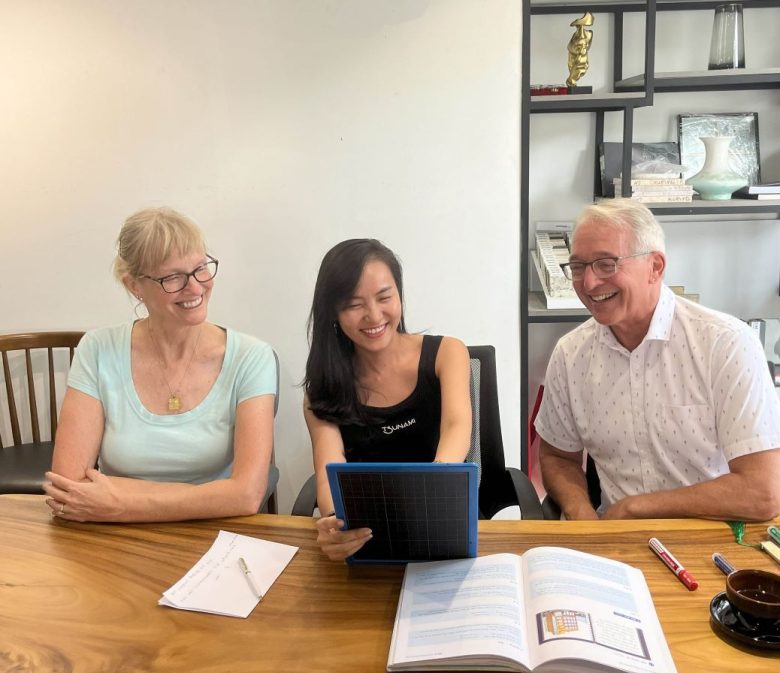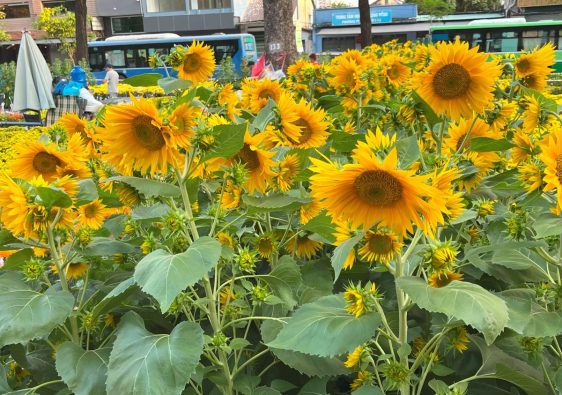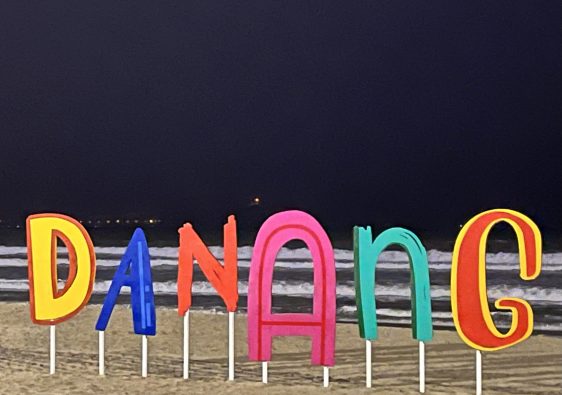As we get ready to leave Việt Nam after 2 years, we agree that taking Vietnamese language classes during our time here is one of the best decisions we made. We, of course, aren’t fluent (by a long shot), but it has allowed us to communicate a little better. We also found that learning how locals greet each other, how they form sentences and questions, and use common slang terms, and idioms, gives us a better understanding of the culture.
Vietnamese, with 12 vowel sounds, 6 tones, and the tricky consonant pair “ng” at the start of words (i.e. ngủ= sleep), is arguably one of the most difficult languages to learn. We knew we wouldn’t master it by any stretch of the imagination, but with the help of our lovely (and patient) teacher, Kim, we feel like we can speak passable/understandable Vietnamese for some day-to-day interactions. Things like being able to identify and ask for different fruit and veggies at a market stall (and when they will be at their peak for eating), ask not only how much something costs, but also understand the numbers when they tell us. We can give directions to our motorbike/car drivers, tell people where we’re from (which we get asked all the time), and can also tell them that we’re retired (nghỉ hưu) and that we live in Việt Nam.
The Vietnamese people have been so friendly and are happy to know we’re trying to learn the language. I always tell people, “Người Việt Nam rất tốt bụng!” Roughly translated this means, “Vietnamese people have very good belly” which is how to say that someone is friendly and kind.
Below is an interview that I had with our teacher Kim over lunch to ask her about her experience as a Vietnamese language teacher:
S: Mark and I have been taking language classes with you for about 1 year. When we first started, you told us that the first ten hours of class would be spent just learning the different vowel sounds and after that, we would spend several weeks of learning the tones. I know lots of people want to dive right in and just learn how to say certain phrases. Why do you think it’s so important that students understand the vowels and tones before any phrases?
K: Actually, when I first started teaching, I would work with students on “survival” words and phrases. But what I noticed was that, even if that person was in Việt Nam for a long time, she/he still couldn’t speak the language or have any kind of conversation. So, because I’m a teacher and I really want my students to learn, I decided to change my teaching method to help my students speak Vietnamese more clearly, have a better grasp of the language, and live in Việt Nam more comfortably. I researched and tried a few things, but I eventually came up with my own method. That is to teach the vowel sounds and tones first and build from there. I feel if students don’t have that foundation, they won’t progress.
I’m also an artist and I’ve found that making drawings for my students to show them not only the shape of the mouth for different sounds (vowels and consonants), but also how the tongue and throat get involved to help them speak more correctly and clearly.
S: Those drawings helped us a lot! How long have you been teaching?
K: I’ve been teaching for 16 years. During college, my countryside girlfriends and I wanted to help our parents by paying our own tuition. I began an internship at a bank which I found very unfulfilling. One day I thought, I’m not going to keep doing a job that I don’t like and began to look for other work. I remembered that back in high school I loved working with my schoolmates who needed some help with different subjects, so I got a job at a Tutoring Center. Not only was I doing work I enjoyed more, I was making better money teaching/tutoring than my roommates who were working at restaurants or other jobs for longer hours.
While tutoring, I found out that teaching English would pay even better, but at that time, my English was not very good. I made up my mind to do whatever I needed to so that I could improve my English, including hanging out in parks and markets where lots of expats were and asking if I could practice speaking English with them.
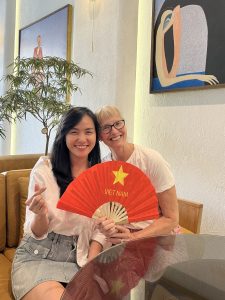
One day, I met a person from Canada who asked if I could teach him Vietnamese. One thing led to another, and I found my passion – helping people learn Vietnamese.
S: What’s your favorite thing about being a Vietnamese language teacher?
K: I remember the first time a Vietnamese language student told me that I was a good teacher. I felt so proud and happy. I think that my students also feel proud of themselves and they enjoy living in Việt Nam more when they realize that they can meet and have a conversation with people.
I think there are two times that you’re born – once when you’re born to the world, and the second time when you know why you’re here. I feel like I’m here to teach Vietnamese. And so for 10 years now, I’ve been doing work that is my passion. (Pause interview to dry eyes and give hugs 🙂
S: (Continuing interview) I feel that as I’ve learned the language, I’ve also learned more about the culture. You’re so willing to go into depth about why certain phrases, questions, and words are a part of the language. Is this something that you try to weave into your teaching?
K: I know that you’ve told me that you and Mark were surprised when Vietnamese people would ask how old you were (which you say no one would ask a stranger in the U.S.) I enjoyed being able to teach you something about our culture so that you understood why they would ask you that question. You learned that in our culture, knowing someone’s name is not important because we refer to each other in terms of hierarchy to ourselves: child (con), young person (em), older sister/brother (chị/anh), older auntie/uncle (cô/ bác), and older grandmother/grandfather (bà/ông)
I think that if you understand some of the culture and the reasons that we speak a certain way, or ask certain questions, you feel like you’re doing more than just learning words. You’re learning the beauty of the people and culture and you feel like you really live in Việt Nam.
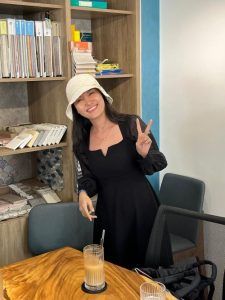
S: Many friends who know that we’re leaving Việt Nam soon question why we continue to take classes. I tell them that we do it because we enjoy learning the language, we love the look on people’s faces when we (try to) speak to them in Vietnamese, and I also tell them that my teacher has become a good friend and classes are fun and full of laughter.
Thank you so much for your time for this interview today and also the time you’ve spent patiently teaching us for these last twelve months.
K: Cảm ơn chị
*(Note: Kim is younger than I am, but she has the position of teacher, so I call her “cô” out of respect for her position.)
Cảm ơn = Thank you / bạn tôi = my friend)
